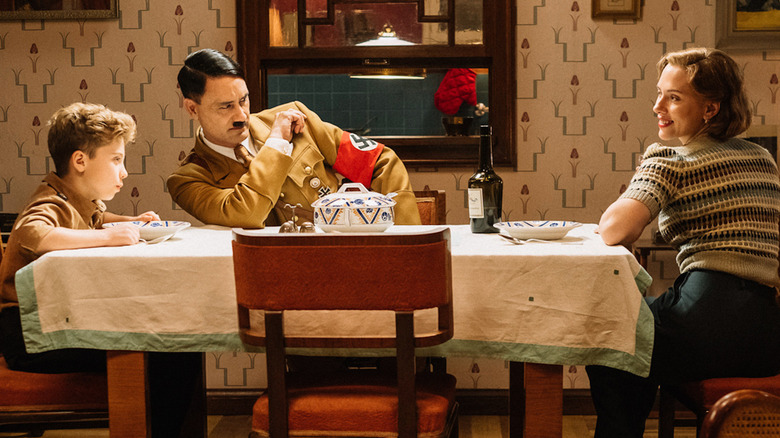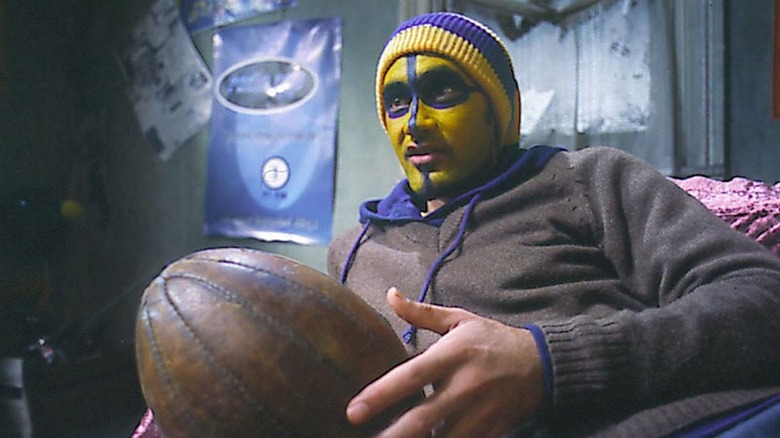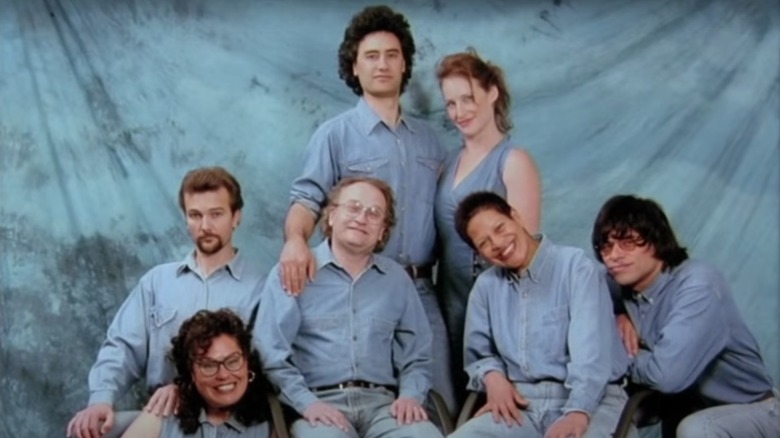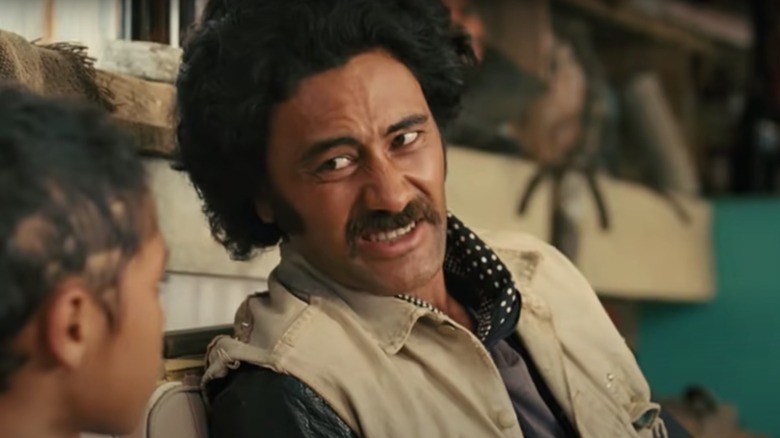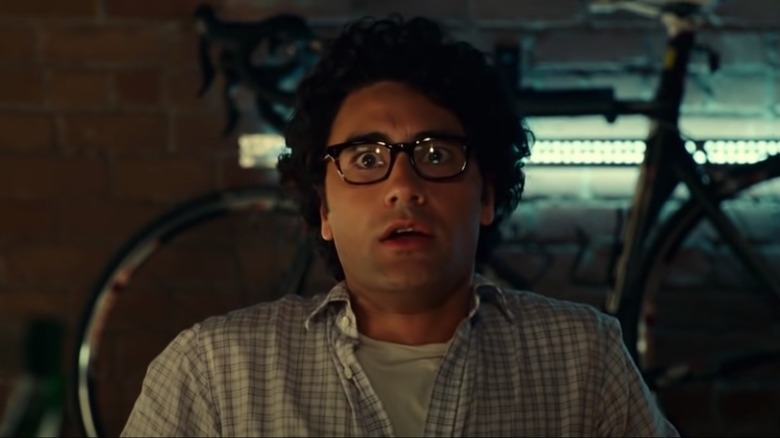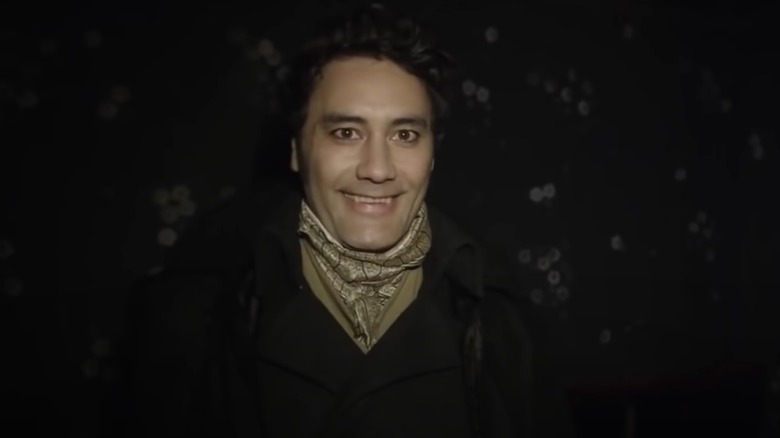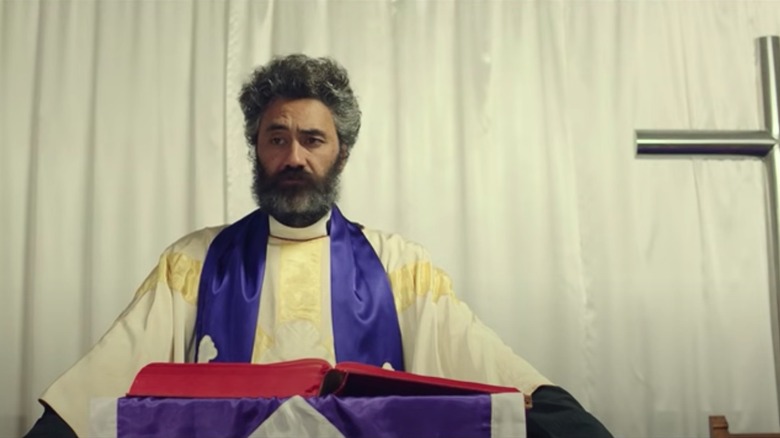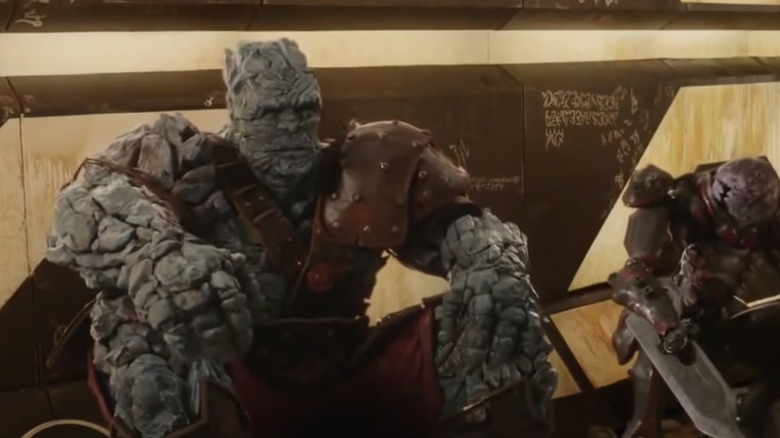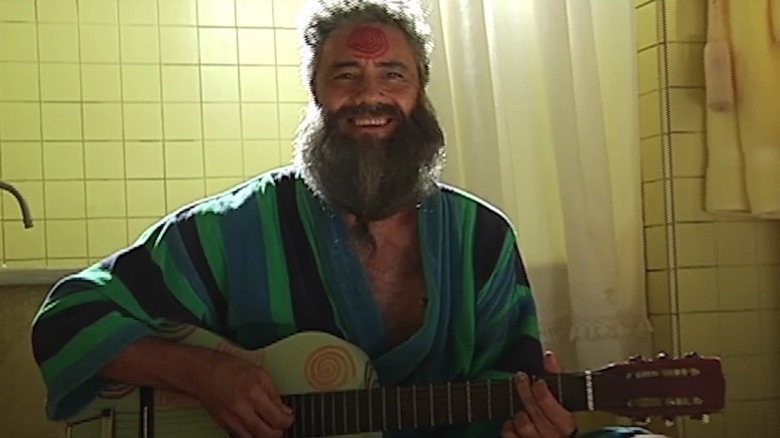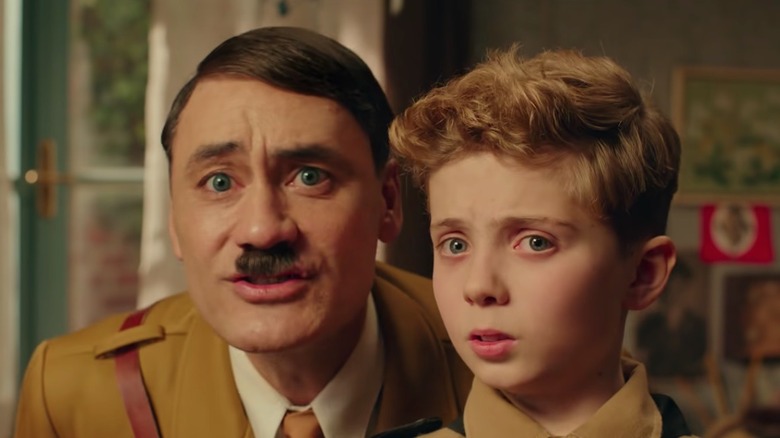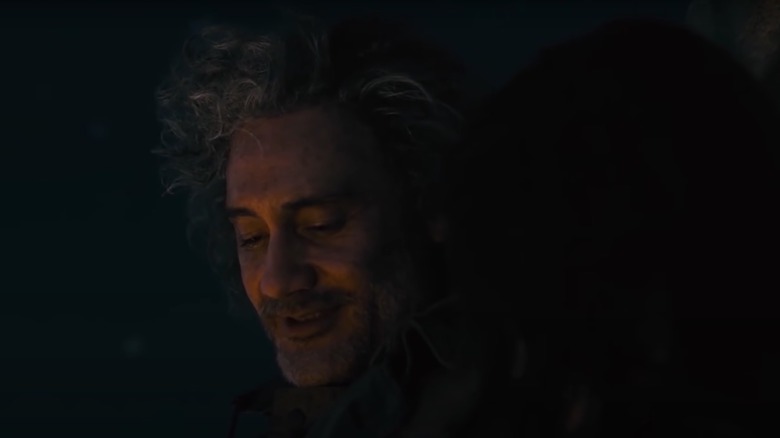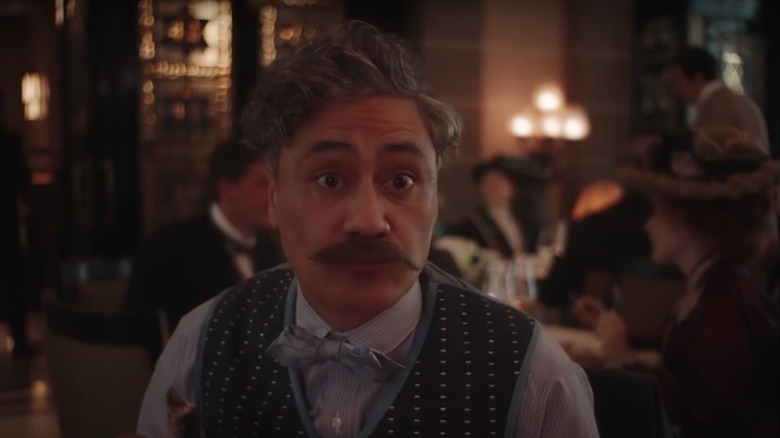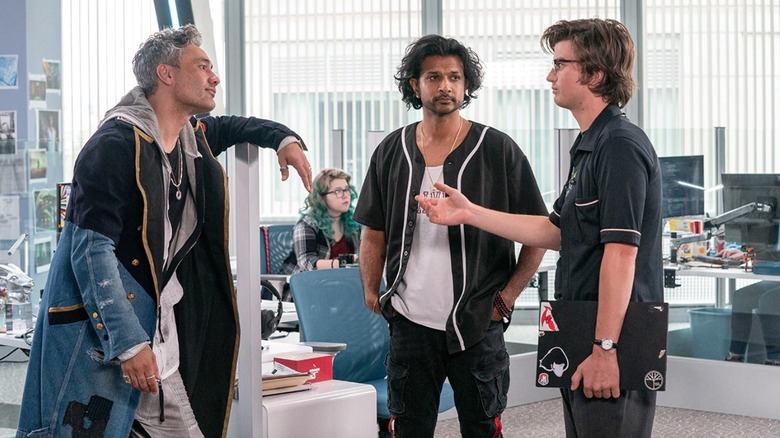12 Best Taika Waititi Movies That He's Done As An Actor
It's perfectly understandable that most film fans know Taika Waititi primarily for his work as a director, given that he's helmed such films as the Marvel blockbuster "Thor: Ragnarok" and the Oscar-winning WWII dramedy "Jojo Rabbit." While viewers likely noticed that he also starred in the latter (as a child's imaginary-friend version of Adolf Hitler), they may not be aware that the New Zealand-born director has also amassed an impressive roster of screen credits as an actor.
In fact, a quick look at Waititi's IMDb credits confirms that he actually began his professional showbiz career in front of the camera, and didn't begin exploring directing until later. "I started out as an actor, and was also involved in standup comedy and visual art," he said, explaining why shifting to directing was ultimately something of a necessity. "Unfortunately, there aren't enough interesting acting roles in New Zealand to sustain a career," he said. "At a certain point, I decided I just needed to make my own work." As fans anxiously await his hugely anticipated Marvel sequel "Thor: Love and Thunder," it's the ideal time to look back at the 12 best Taika Waititi movies that he's done as an actor.
Scarfies (1999)
Taika Waititi made his screen debut in the 1999 New Zealand film "Scarfies." The title refers to the nickname given to students attending the University of Otago in the New Zealand city of Dunedin, for the yellow-and-blue scarves they traditionally wear in support of the Otago Rugby Football Union. Waititi plays Alex, one of several Otago students to move into a seemingly abandoned house, a living situation that becomes perilous when the home's owner turns up to retrieve the large stash of marijuana he'd hidden in the basement.
According to the film's director Robert Sarkies, Waititi's charisma was evident from the beginning. "I remember seeing his [audition] tape and thinking, 'Well he's just f***ing cool.' It was obvious back then," Sarkies said in an interview with New Zealand's NewsHub, recalling the actor's "screen presence" and "undeniable coolness ... There was no competition. I just went 'Well, there's our Alex.'" Yet despite that phenomenal audition, Sarkies admitted Waititi didn't exactly nail the role, at least not at first. "I remember the first day on set it was slightly tricky, he just wasn't clicking into it. He was trying, but there was something slightly flat about it," said Sarkies. "But by the second day on set — just by observing the more experienced actors on set, he just totally clicked into it and he was an incredible presence every time we rolled the camera." Waititi wound up earning a nomination for Best Actor in the Nokia New Zealand Film Awards.
Eagle vs Shark (2007)
The success of "Scarfies" led to more film and TV roles for Taika Waititi, most notably a recurring role in New Zealand TV drama "The Strip." At the same time, noted a biography for New Zealand's The Arts Council, he'd begun directing short films, the second of which — "Two Cars, One Night" — received an Oscar nomination. In 2007, Waititi directed his first feature film, the quirky comedy "Eagle vs Shark." The film stars Jemaine Clement ("Flight of the Conchords") as Jarrod, a socially awkward misfit who falls for a similarly awkward woman named Lily (Loren Horsley) while pursuing his singular obsession of getting even with the bully who terrorized him in school.
"Eagle vs. Shark" also featured Waititi in a small role he created for himself: Gordon, Jarrod's late brother, who will always be far more beloved by his family than Jarrod is. Given Waititi's brief on-camera role, the film belongs entirely to Clement and Horsley, which is how Waititi intended it. "It is a small, cute, quaint, quirky, quiet, quivering film about love and acceptance," Waititi described his directorial debut in an interview with IndieWire, chronicling the "painful and yet hilarious process" of these two outsiders falling in love.
Boy (2010)
For his second feature as a director Taika Waititi grew more ambitious. The 2010 film "Boy" delves deeper into his own Maori heritage (his father is Maori, and his mother is of Russian-Jewish descent). Set in 1984, the film follows an 11-year-old Maori boy named Boy who's obsessed with Michael Jackson. His life is upended when he meets the father he's never known, played by Waititi. Unlike "Eagle vs. Shark," Waititi's role here is a far larger one, a low-level criminal who's been absent for his son's entire existence, and who only re-enters his life because he's eager to retrieve some cash that he's buried years before.
As Waititi told The Moveable Fest, he wrote the film "because I was more disheartened with how the Maori were portrayed usually in film and how these kinds of characters seemed flat. I really like the idea of characters who had a lot more going on for themselves and how our idea of someone who should be the s***ty father [can] actually [be someone] you can sympathize with if you figure out where their inadequacies come from." Interestingly, Waititi hadn't originally planned on playing Boy's father. As he told Interview Magazine, he was two months away from starting to shoot and still hadn't found the right actor. "I had taken a couple of years off from acting, and I found myself falling into the character," he said of why he finally cast himself.
Green Lantern (2011)
Following his turn as actor/director in "Boy," Taika Waititi's next acting role was his biggest yet: Tom Kalmaku in the comic book adaptation "Green Lantern." As it turned out, playing the best friend/sidekick to Ryan Reynolds' titular superhero was something of a mixed bag, as Waititi's first big Hollywood movie was also a universally reviled bomb, generally accepted to be one of the all-time worst superhero movies ever made.
In hindsight, Waititi has maintained a sense of humor about "Green Lantern." "What's the project you're talking about? I've never heard of it. Green ... what?" Waititi quipped in a 2020 interview with Total Film (via Games Radar). During that same interview, Waititi explained why he was happy to embrace the embarrassment of having been part of "Green Lantern":
"I find it really funny that I did that film. The thing is, it's like when people shy away from things, and they don't want to admit they've done something, or they don't ever reference it, I find it worse ... If an actor is brave enough or comfortable enough in themselves to acknowledge it, and to be self-deprecating, and to own that they have been a part of something that's been lambasted a bit, then I think that's great. Because when you can make fun of yourself, then everybody else understands: 'Oh, we're all in on the joke.' Because if you pretend it never happened, then it makes it kind of weird and uncomfortable for everyone."
What We Do in the Shadows (2014)
After being an actor-for-hire in the disastrous "Green Lantern," Taika Waititi wisely chose to make his next project one in which he was director, co-writer, and actor, reuniting with his "Eagle vs Shark" star Jemaine Clement for "What We Do in the Shadows." The 2014 comedy featured Waititi playing Viago, one of a group of immortal vampires living together in a run-down New Zealand mansion. The film won rave reviews, with USA Today's Claudia Puig describing "What We Do in the Shadows" as "a pitch-perfect genre spoof," while Michael Phillips of the Chicago Tribune declared it was "a comedy that works."
In fact, the film was so successful that it spawned a U.S. TV series of the same name for the FX network, with Clement and Waititi serving as exec producers (Waititi also reprised Viago in a few episodes). As Waititi admitted in an interview with Empire, the movie had been a long time coming. "It took us nine years to make this movie, by the way," he said, revealing he and Clement first came up with the idea back in 2005. In that interview, Waititi also divulged how he came up with Viago's unique vocal characteristics. "He's partly this guy I once met when I was traveling: a German guy who just had a very high-pitched voice," he explained.
Hunt for the Wilderpeople (2016)
Taika Waikiki followed up "What We Do in the Shadows" by directing "Hunt for the Wilderpeople," an acclaimed comedy that paired one of New Zealand's most well-known actors, Sam Neill of "Jurassic Park" fame, with new kiwi discovery Julian Dennison (who would go on to appear in "Deadpool 2" and "Godzilla vs Kong"). In the film, Dennison plays Ricky, a juvenile delinquent forced to live with his gruff foster "uncle" Hector (Neill) and his wife, Bella. When Bella dies shortly after his arrival, the event triggers a series of events that sends the two on the run into the wilderness.
Waititi has a small role in the film, portraying the minister who conducts Bella's funeral. In the brief but memorable scene, the clergymen goes off on a bonkers rant about choosing doors, with the right choice resulting in a door that, when opened, conceals Fanta, Doritos, and "all the nummiest treats you can imagine." Yet there's another door, he tells the funeral attendees, asking them to guess what's on the other side. "Vegetables?" guesses Ricky, while a parishioner suggests that Jesus is behind the door. "You would think Jesus. I thought Jesus the first time I come across that door. It's not Jesus. It's another door. And guess what's on the other side of that door?" Waititi's minister asks. "Jesus?" the parishioner responds. "Yeah, Jesus," says the minister. "He's tricky like that, Jesus."
Thor: Ragnarok (2017)
The critical and commercial success of "Hunt for the Wilderpeople" catapulted Taika Waititi onto Hollywood's A-list, and his next directorial project was a doozy: "Thor: Ragnarok," a Marvel movie with a massive $180-million budget that easily eclipsed the budgets of all his earlier films combined. As in those movies, he cast himself in a role: Korg, an alien who introduces himself to the film's titular Norse god (Chris Hemsworth) as "the pile of rocks waving at you." While the character was created for the film via CGI, Waititi provides his voice, using a distinctive Kiwi cadence not unlike his actual speaking voice.
Appearing on British talk show "The Last Leg," Waititi was asked about the inspiration for Korg's accent. "That's actually my normal accent," he joked before revealing how he came up with Korg's voice. "In New Zealand, we have, like, a lot of bouncers, Polynesian bouncers and that's their accent," he said, noting the incongruity between "these giant, hulking dudes" and their high-pitched voices. Meanwhile, in an interview with The Gate, Waititi explained why Korg, like the other characters he's played in his films, has a relatively small part in the movie. "As a director, when I put myself in my movies it's actually better if the character isn't necessarily very important," he said. "This character really just sits around commenting on things, you know?"
Seven Stages to Achieve Eternal Bliss (2018)
After introducing the world to Korg, Taika Waititi's next role wasn't in one of his movies, but in someone else's: "Seven Stages to Achieve Eternal Bliss" from director Vivieno Caldinelli. In the dark comedy, Waititi plays Storsh, the late leader of a bizarre cult whose followers flock to kill themselves in the same bathroom where Storsh took his own life. This is a real bummer for the couple (Sam Huntington and Kate Micucci) who now live in the dead cult leader's former apartment. "From time to time, members of a deranged cult break and enter in order to commit self-murder," a cop ("Community" creator Dan Harmon) tells the couple in the trailer. "Did the super not go over this with you when you looked at the apartment?"
While Waititi's participation in the film is limited given that Storsh is already dead when the movie begins, his character is at the center of the storyline. Storsh is seen in a video made for his followers in that very bathroom in which the bathrobe-clad, bearded cult leader sings a song about "instantaneous eternity" while strumming a guitar. "Life is a journey, and as we move along the path we move closer to the light that awaits us," Storsh says to the camera. "But I say, why wait? Why not launch yourself into that instantaneous eternity right now?"
Jojo Rabbit (2019)
In 2019, Taika Waititi combined his experience shooting big-budget blockbusters with the scrappy indie sensibility of his earlier films for "Jojo Rabbit," a comedy set in Nazi Germany during World War II. Adapted from the book "Caging Skies" (Waitii won an Oscar for Best Adapted Screenplay), the story involves the titular young boy (Roman Griffin Davis) who's so deeply involved in the Hitler Youth that he's created an imaginary friend based on no less than Der Führer himself (played by Waititi). This time out, Waititi crafted a fairly substantial role for himself, playing a boyish, fun-loving make-believe iteration of Adolf Hitler.
That wasn't his original intention, though. "Well, Searchlight, who made the film, they said, 'We only really want to make it if you play Hitler,'" Waititi divulged during an appearance on "The Ellen DeGeneres Show, admitting that "made no sense to me. Because look at me." He ultimately agreed, he told Rotten Tomatoes, because "it made sense in that you don't want a really big star playing this role because then it becomes about them. It becomes 'the so-and-so Hitler picture,' and they would be the only person on the poster. And all the chat would be about that and instead of what the film is really about, which is about these kids. So I accepted the role."
The Suicide Squad (2021)
Taika Waititi made a brief but memorable cameo appearance in 2021's "The Suicide Squad" (not to be confused with 2016's "Suicide Squad"). His character of Ratcatcher 1 is seen only in flashbacks and is the father of Suicide Squad member Ratcatcher 2 (Daniela Melchior). Both father and daughter have the same power, to psychically command an army of rats to do their bidding.
As for how Waititi became involved in the film, director James Gunn offered a simple explanation. "I called him," Gunn told IndieWire, revealing he initially offered him a different, more expansive role. Unfortunately, at the time Waititi was deeply enmeshed in pre-production for "Akira," a live-action remake of the 1988 anime classic, and scheduling difficulties made it impossible for him to act in "The Suicide Squad." Then, Gunn recalled, "[Taika] wrote me and he said, 'Oh, [the] f***ing movie fell apart. Is that role still available?' And I said, 'No, but let me get you in something else.'" As for what Waititi's original role would have been, Gunn wouldn't say, given that he wound up casting a different actor for the part. "I would feel too bad," he said of why he wouldn't reveal which character he originally offered to Waititi.
The Electrical Life of Louis Wain (2021)
The same year that Taika Waititi appeared in a cameo in "The Suicide Squad" he also made a cameo in another movie, Prime Video's "The Electrical Life of Louis Wain." Directed by Will Sharpe, the film is a biopic about the titular Louis Wain (played by Benedict Cumberbatch), a wildly eccentric artist who became a celebrity in the early part of the 20th century due to his downright bizarre paintings of cats.
Waititi plays Max Kase, a real-life newspaper writer and editor whom Cumberbatch's character meets, who tells him his cat paintings have become hugely popular in the U.S. However, Waititi wasn't the only star to make a cameo in the movie, as Oscar-winner Olivia Colman and singer Nick Cave also appeared in the film as the movie's narrator and "War of the Worlds" author H.G. Wells, respectively. Waititi jokingly mocked his cameo role, retweeting an Empire story on the cameos featuring a photo of him as Kase. "Cameo queen," he wrote in the caption.
Free Guy (2021)
A decade after he played the best friend of Ryan Reynolds' character in the ill-fated "Green Lantern," Taika Waititi and Reynolds reunited for the 2021 action-comedy "Free Guy." This time out, however, their characters were far from friends. Reynolds played Guy, a suddenly sentient minor character within a video game, while Waititi portrayed the game's arrogant and obnoxious zillionaire creator, Antwan Hovachelik. "Antwan's got basically no vocab, he's super uneducated," said Waititi in a promo video for the movie, offering his take on the character. "He'd say something like, 'Yo, I'm no rocket surgeon, you know.'"
In that same promo, "Free Guy" director Shawn Levy sang Waititi's praises. "Taika Waititi takes an already funny script, and is riffing on a level that is fricking sublime," Levy gushed. Meanwhile, Jodie Comer, who stars in the movie alongside Reynolds, flat out declared, "Taika is a genius. I literally came to set on days that I wasn't in, to watch his scenes, because what that guy does is, like, insane."
